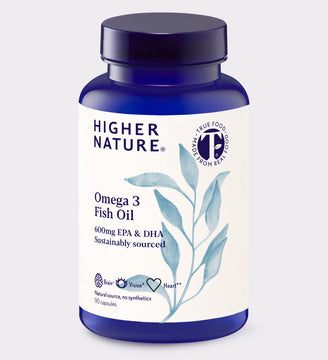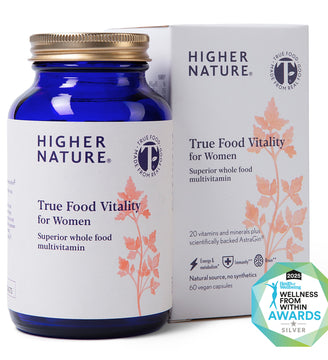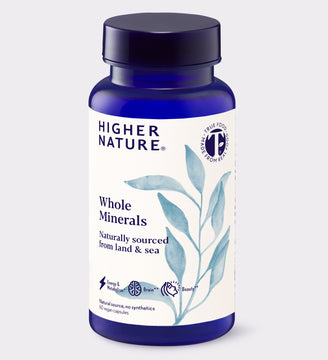
Eating for Energy
Lynsey Vaughan - Higher Nature Nutritionist & Product Innovation - MSc
Life is full of things needing our energy, many of which are a source of joy or cause for celebration. However if you’re struggling with summoning the energy to fully enjoy all the things you want to do this can be frustrating.
More energy is something many of us strive for and can be one of the best measures of health. It’s required for every cell in the body, so what can you do to support your energy production?
Eating for energy
In cells, mitochondria convert the energy contained in the foods we eat to ATP. This is a usable form of cellular energy. Eating to support optimal energy requires plates that are filled with sufficient fuel in the form of macronutrients for your individual needs. Your cells need glucose from carbohydrates, amino acids from proteins and fatty acids from fat.
In addition to this, we also need enough micronutrients (vitamins and minerals). Micronutrients support your body’s physiological processes so cells can produce energy, transport it to where it is needed and use it.
This is why it is so vital to eat well to keep your body functioning at its best and your energy levels strong.
Balanced diet = balanced blood sugar = stable energy
It’s important to ensure a good balance of carbohydrates, proteins and fats in all your meals to maintain more balanced blood sugar. Unlike the quick uptick and subsequent “sugar crash” from eating refined sugars, balanced blood sugar means more stable energy levels all day long.
If your energy is a fire, you can think of carbohydrates as twigs, - they will give a short burst of flame/energy. If we follow this analogy through your protein and fats are the bigger branches and logs giving you slow burning, longer lasting fuel.
As is often the case in nutrition, the sweet spot is generally somewhere in the middle, i.e. balanced! Eating “low-carb” can have consequences on your gut health, as friendly bacteria love the phytochemicals and different types of fibres provided by fruits and vegetables. Aim for a portion (around ¼ of your plate) of starchy carbohydrates with dinner (this has been shown to improve sleep) and fruit as a snack, just be sure to balance these with some quality protein, fats and some fibre.
A palm sized amount of protein is suggested for main meals, and half a palm sized amount for snacks. For example, pair some nuts and seeds with your break time mandarin, or some cheese with your grapes, natural yogurt with your banana, peanut butter with an apple. These are all super simple, delicious and nutritious ways of upping your nutrient intake, whilst supporting blood sugar balance to ensure more stable energy levels.
Choosing wholegrains and eating the skins of starchy vegetables like potatoes can provide a boost of fibre. Extra fibre will not only slow down the release of sugar into the bloodstream but also provide fuel for your friendly gut bacteria and help with regular bowel movements. Switch up your rice and pastas, and try to incorporate a wider variety of wholegrains such as quinoa and buckwheat.
While a diet-first approach, with a balance of carbohydrates, proteins and fats and a wide variety of plant foods is crucial to overall health and energy production, there are some key nutrients you might like to give more focus to if you are wanting to prioritise your energy.
Top nutrients for energy
Carb helper-Chromium
If you know balancing your blood sugar is an issue for you, the mineral chromium can be incredibly helpful. It helps support insulin sensitivity and transport glucose into the cells where it is needed.
As this mineral comes from the soil, eating lots of different vegetables and fruits, as well as grass-fed meats can go a long way to support your intake - broccoli is particularly high. Otherwise taking some from a supplement can help, particularly if taken in the morning
H2O
Water makes up the majority of your body (even bones are approximately 25% water). It is so essential for our cells that as little as a 1% drop in hydration can lead to tiredness, reduced cognitive function, alertness and exercise capacity.
Research currently supports recommendations of 33ml of water per kilogram of body weight, however individual requirements depend on many factors such as water content of foods eaten (plant foods are particularly high!) as well as sweat loss from exercise, environmental temperature and humidity. As a rough guide, you are well hydrated when your urine is the colour of light straw.
Busy B’s
B vitamins are involved in the biochemical processes needed to turn carbs, proteins and fats into useable energy.
Eating a healthy diet which includes wholegrains, leafy greens, eggs, nuts, seeds, pulses, dairy, fish, poultry and lean meat will stand you in good stead as far as the B vitamins go, but they can easily become depleted during times of physiological and psychological stress. B vitamins work together as a team, so supplementing with a high strength B complex can be a great way to make sure you are not running short.
Magic magnesium
This mineral is essential for over 600 reactions in the body, including enzymes involved in the production of energy, but we use up more of this nutrient when we are stressed, so it can easily become depleted.
The best food sources are dark leafy greens, nuts and seeds. Many of us can find it challenging to eat enough of these daily. Try adding them to smoothies for a delicious way to get a good serving of these nutrient dense foods. Alternatively look for a high strength supplement to boost your levels.
Abundant co-Enzyme Q10
This is an antioxidant found in the mitochondria which is essential for producing the ATP in cells.
Although your body makes its own Co-enzyme Q10, as we age we naturally produce less, so it can be great to add in alongside B vitamins and magnesium to support energy production.
Incredible Iron
Struggling with energy is a key symptom of iron deficiency. Iron is required for haemoglobin to carry oxygen to every cell. It also helps numerous enzymes involved in both energy production and thyroid hormone function. Low iron is of particular concern for those menstruating due to the amount lost every monthly cycle.
Animal based sources are the most bioavailable, with organ meats like liver and kidney coming in at the top, red meats, and to a lesser extent poultry, fish and eggs.
Although less easily absorbed, good plant-based sources include pulses and legumes, dark green leafy vegetables, tofu, nuts and seeds. Cooking and combining iron-rich foods with vitamin C containing foods helps increase the bioavailability of iron.
Supplementing can be a great way (and sometimes essential) to increase iron and feel improvements if this is a cause for your low energy. Remember to ask your doctor to test your levels to assess your needs as both too much and too little can have negative effects.
Ideal iodine
Iodine is essential for thyroid function, helping to make thyroid hormones. Every cell in the body has receptors for thyroid hormone, and thyroid function affects your metabolism and therefore your energy.
The best sources are seafood and sea vegetables (e.g. seaweeds), dairy products and eggs. Supplementing can be helpful for some as iodine content of foods has considerable natural variability due to environmental factors. Kelp can be a great choice, it naturally contains high levels of iodine along with other trace minerals and phytonutrients.
Selenium savvy
Selenium is also essential for thyroid function. It helps convert inactive thyroid hormone to the active form so vital for energy production.
Selenium is required for a variety of antioxidant enzymes which are key for protecting DNA, proteins and lipids from oxidative damage. Protection of cells and membranes is crucial for energy as this improves mitochondrial function and the transport of nutrients in and out of cells.
Brazil nuts are an easy way to up your intake, just a few every day can supply all you need. Other good sources are seafood, organ meats and wholegrains. If you aren’t keen on these foods supplementing can be a smart move.
Lifestyle considerations
Although a balanced and varied nutrient dense diet can go a long way to support energy production and how much oomph we feel, there are other lifestyle factors which can either boost or zap our energy.
Exercise
As muscle cells require quick and easy access to energy, they are particularly high in mitochondria. So one way to increase your production of these little energy factories is to build and maintain muscle by incorporating some resistance exercise into your routine.
Sleep
Quality AND quantity are important here!
Research consistently shows the importance of sleep for health and wellbeing. Although it may seem an obvious factor for energy levels, getting enough quality sleep is something many of us struggle with. This can be due to stress, busy schedules and demands. Difficulty falling and staying asleep is also very common.
Between 7-9 hours a night is the sweet spot for adults. Check out our article for some great tips on improving your sleep.
Stress
When we are stressed, our bodies use more and lose more B vitamins, vitamin C, magnesium, and zinc.
These nutrients are all essential for reactions involved in the stress response which can lead to fewer resources being available for your body to produce energy. Stress can really leave you feeling worn out and less vibrant.
Have a read of this article which focuses on stress and how to support resilience.
Alcohol
The liver is one of the largest and hardest-working organs and requires significant amounts of nutrients (particularly B vitamins) and energy to carry out its essential functions. Regularly consuming alcohol can put extra pressure on your body’s valuable resources and can be dehydrating which can also contribute to sluggish energy. Try to incorporate alcohol-free days in the week to help your liver recharge.
Caffeine
Yes coffee is delicious, but it might be worth re-evaluating how much you’re consuming. We know it may give you a boost of energy, but it can upset blood sugar control. It also causes stress hormones to be produced so too much can be counter-productive in the long run. Try to curb consumption after midday if you have trouble sleeping.
Immunity
Our immune systems are incredibly complex and are constantly working to protect us. To function well the immune system is incredibly resource hungry.
Normal immune function requires a wide variety of macronutrients, vitamins and minerals to carry out its range of duties. When we are under the weather fatigue and lack of energy are common, so support your body with nutrient dense foods to help replenish levels during and following illness.
See this article for tips to support recovery.
As you can see, there are numerous factors to consider when working towards improving energy, (and this is by no means an exhaustive list) but it’s always best to start with the basics before exploring other possible avenues.
As human beings, we are made up of incredibly complex biochemical and physiological systems, all of which are intricately linked and still not completely understood by science.
This interconnectivity means that the best approach should be multifaceted or more holistic, however it also means that improvement in one area of health will help support additional areas too.

















